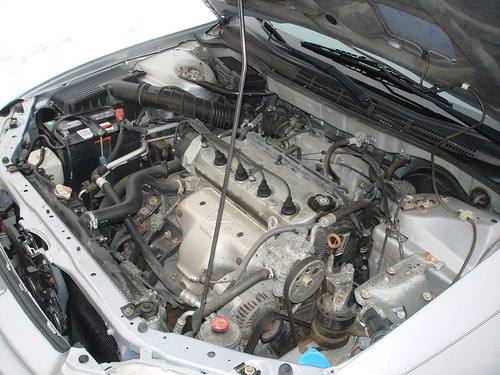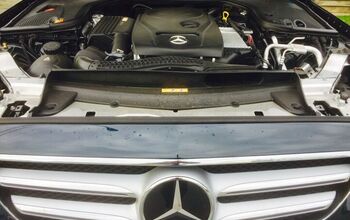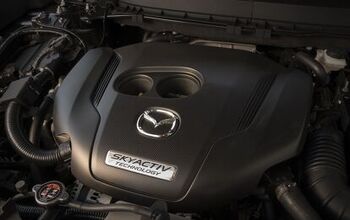Adventures Under the Hood

I’d been wondering if I’d damaged the fuel pump when I ran out of gas a couple of months ago, for the only time in my 350,000-400,000 lifetime miles. Sometimes, after coasting in gear I’d feel the Accord 5-speed subtly hesitate as I gently pressed the gas. But this morning, the engine seemed to be gasping for fuel, and the check engine light–a species which is well known to cry wolf–was blinking at me as if it really meant it. Instead of to the espresso joint, I headed to the local mechanic.
On the way I pressed the codes button on the scan gauge. It was a 304. Carol, the garage’s owner, told me that was a misfire code, and not the fuel pump. She didn’t have an opening in her schedule until tomorrow. As for the problem’s cause, she said, it could be plugs, plug wires, injectors, the fuel filter…
The last time I’d done more than change an air filter, a headlight, or a battery had been in the summer of 1993. I’d sold Bryant the ‘77 Corolla a month earlier, after I’d bought the new Saturn, and early one morning he’d limped the car over, and banged on the door. I think he wanted his $200 back. For reasons I didn’t understand, the points had always needed gapping about every 3,000 miles. So I dragged myself out of bed and gapped ‘em one last time.
I’d learned auto mechanics in Mr. Smeltzer’s class during senior year at Gunn High School in Palo Alto, 1970-71. Although I’d understood the mechanics of internal combustion before my voice had deepened, I was not gifted with a wrench. I did manage to do the tappets, to tune my‘62 Falcon, and to pack the bearings, and on the way back to Boston the following summer I’d given the car a lube and oil change in Omaha, where some gas station had graciously allowed me to use their lift and their grease without even charging me. But in another auto shop incident, I’d stripped a screw hole while inverting the transmission cantilever spring, which I was sure had been upside down. Then I’d struggled painfully with knurling a new screw hole, and widening the hole in the cantilever spring to accommodate a wider screw, and I’d shattered the relevant drill bit, and Mr. Smeltzer had sent me to the hardware store to buy a new one, an embarrassing episode.
Then there was the incident of the worn idler arm. Back in Boston, at Tufts University where I was now a student, and where my parents taught, one afternoon I failed miserably to dislodge the thing while lying cramped beneath the car. I took it to John, my Dad’s mechanic, a big, serious southerner with superb skills. He put the Falcon on a lift and whacked the thing hard, five or ten times with what I swear was a sledge hammer before it went flying, while his colleagues stood by discoursing on the need for appropriate education in order to work on cars.
After the Falcon died the following summer, I went carless for nearly a decade and a half, until I bought the Toyota in ‘85. The first time I tuned it, I lost a couple of screws down the distributor shaft. That little mishap cost me $150 about six years thence. My mechanic, Adrian, of Northeast DC (whose last name I never learned) saint that he was, had searched several junk yards to find a distributor that would fit my by then 14 year old Corolla. But I figure my skills saved me at least five or six times that over the 70,000 miles I drove that car, what with tuneups every 10k and several point gappings in between each. My skills also gave me immense satisfaction when the little 1.2-liter-that-could would sing happily after each tuneup. Oh, how I loved that sound, even if Greg, my best friend, hated that car’s noisy exuberance.
After I bought the Saturn, I hadn’t missed Zen and the Art of Beater Maintenance as much as I’d feared I would. And now, contemplating Carol’s advice, I wasn’t missing it even more as I considered my options. Nonetheless, I knew my skills might save me some tsuris. The Accord, a ‘99, has 172k. I didn’t think the injectors were bad, because I’d been using only top tier gasolines for years. I knew my plugs should still have life in them, as I’d had them changed around 100k, but I thought the plug wires might be original. (I’d bought the car with 67k.) Changing plug wires was something I could do. So off to NAPA.
New wires in hand, I opened the hood and carefully examined the old ones, remembering that I needed to change them one at a time so I would not mix them up. I saw that they were different lengths, and that I would need to use the correct wire for each connection. I lined the new wires up so that I could see their relative lengths. As I carefully replaced each old wire with a new one, I could feel the strain of my brain activating atrophied connections concerning both the conceptual (putting the wires in the right places so the cylinders would fire in order) and the physical (pushing each female part over the corresponding male part until the fit of wire to plugs and distributor was snug). I was not facile.
Now it was time to start the car. I braced myself for failure. “This engine’s probably still going to missfire,” I warned myself. But the engine was so smooth it felt new. Elated, I ran back into NAPA and told the guy behind the counter. I drove to the espresso joint and told Jamie, the barista, a 20-something woman whose multiple talents include racing cars and working on their innards. It’s really no big deal to change the spark plug wires, even after nearly two decades, but for that brief morning I felt a little of what the Red Sox must have felt in ‘04.

I'm a freelance journalist covering science, medicine, and automobiles.
More by David C. Holzman
Latest Car Reviews
Read moreLatest Product Reviews
Read moreRecent Comments
- IBx1 Everyone in the working class (if you’re not in the obscenely wealthy capital class and you perform work for money you’re working class) should unionize.
- Jrhurren Legend
- Ltcmgm78 Imagine the feeling of fulfillment he must have when he looks upon all the improvements to the Corvette over time!
- ToolGuy "The car is the eye in my head and I have never spared money on it, no less, it is not new and is over 30 years old."• Translation please?(Theories: written by AI; written by an engineer lol)
- Ltcmgm78 It depends on whether or not the union is a help or a hindrance to the manufacturer and workers. A union isn't needed if the manufacturer takes care of its workers.


































Comments
Join the conversation
I had a similar success lately with my 02 Mazda Millenia...CEL light is always on (EGR valve flow code), which after spending $$ on diagnosis but no clear concise idea of what's exactly wrong, I've just lived with the light on. But lately it started flashing and the car misfiring. I changed the distributor cap and did new plugs and wires, and the issue seems to be solved (no problems for a couple of weeks now). It's quite satisfying to feel that I have succeeded. Then again, now that I've shared my story, the damn car will probably misfire tonight.
Great article David! Your write-up reminds me of the work I do nearly every week.